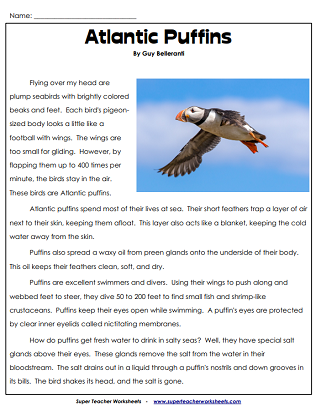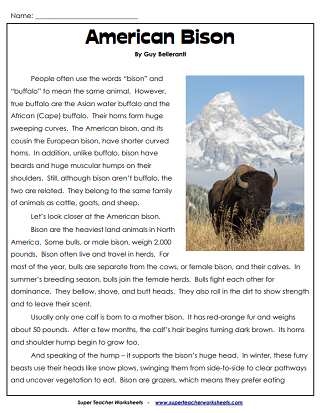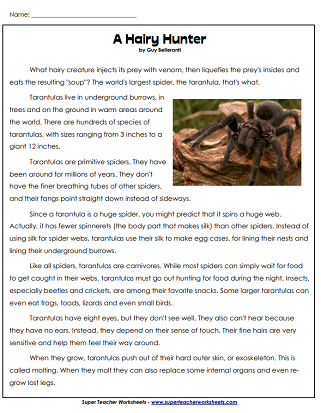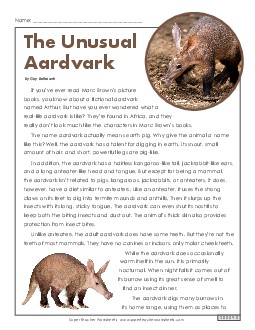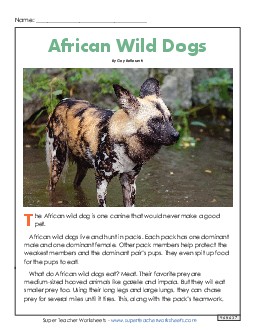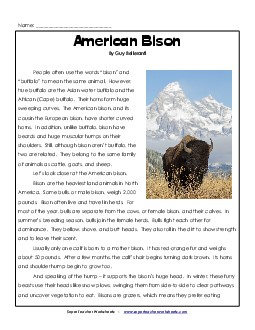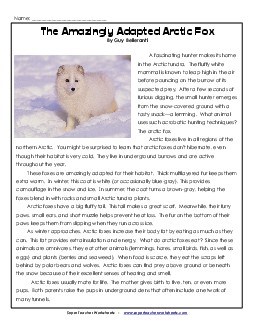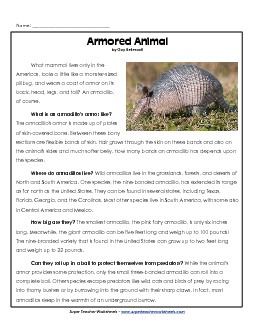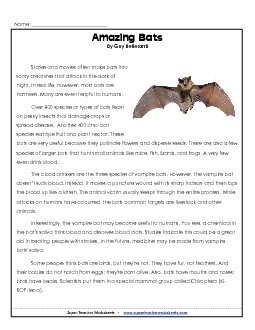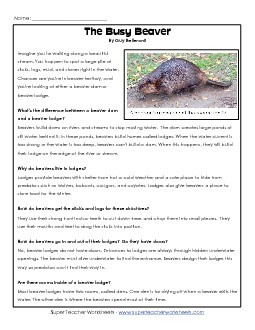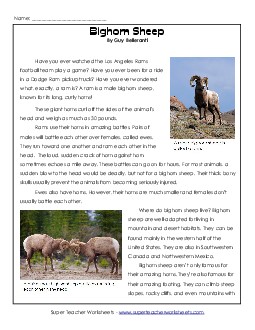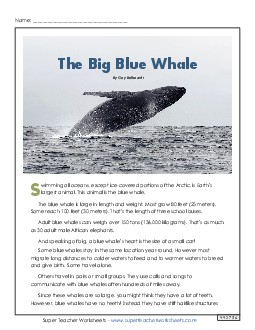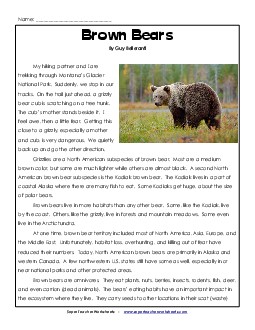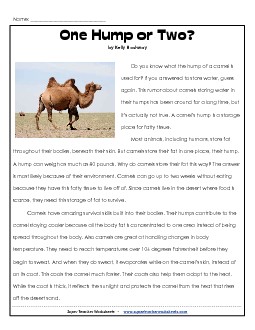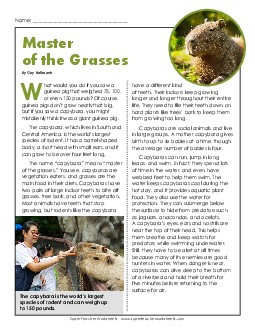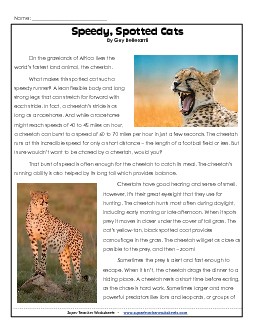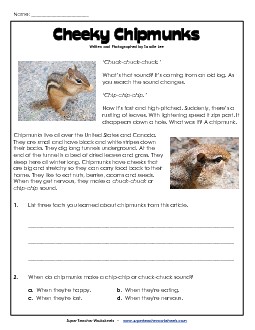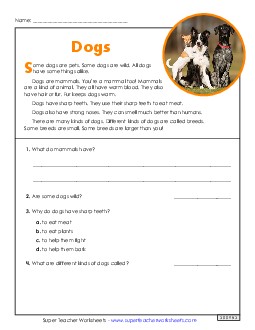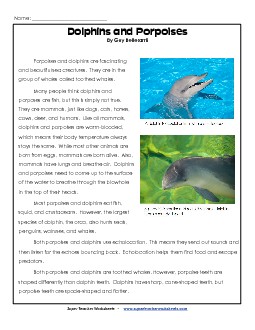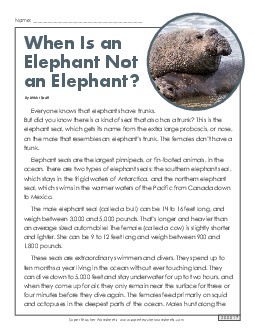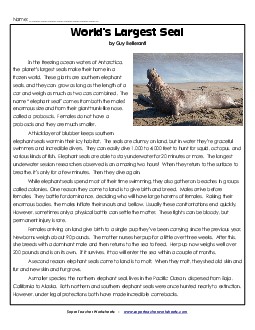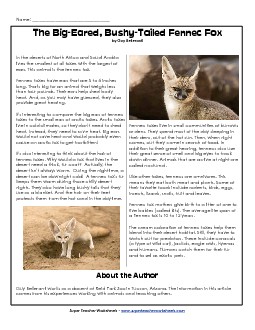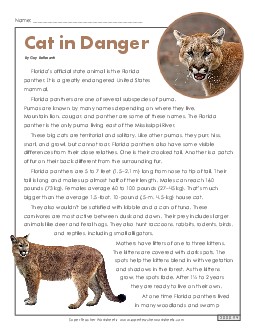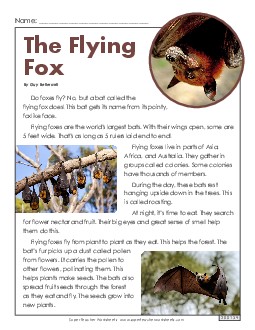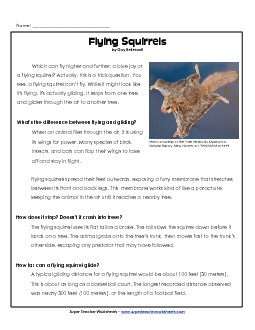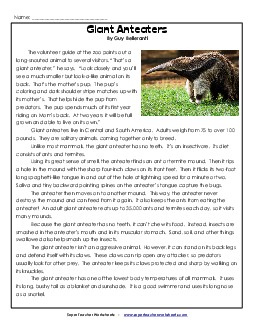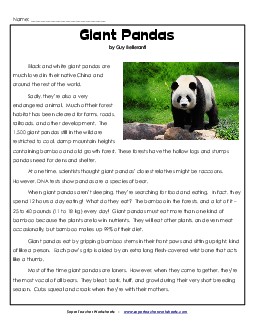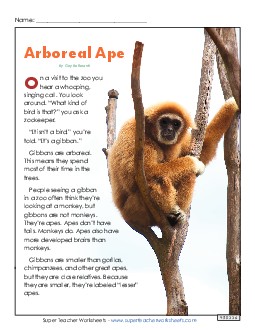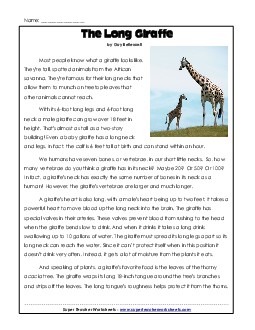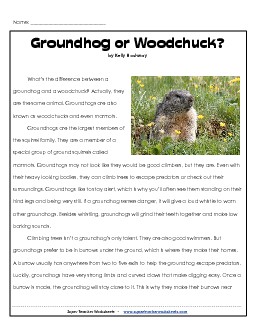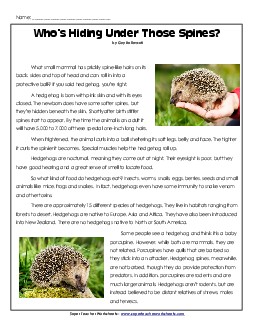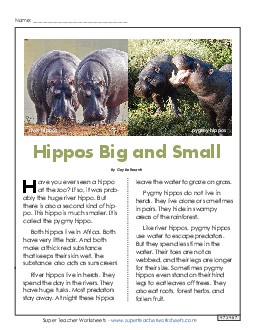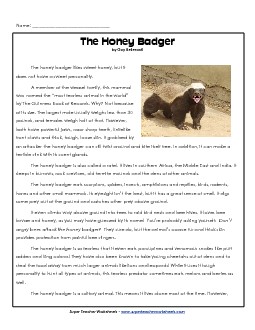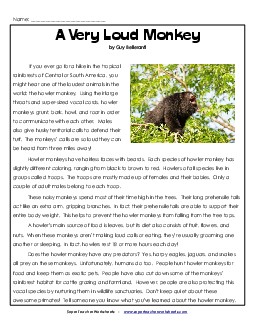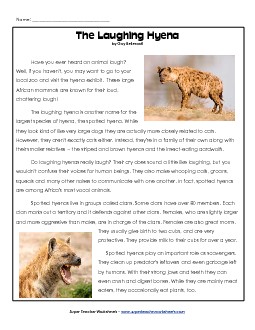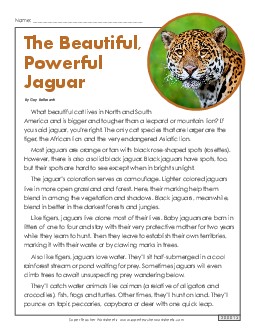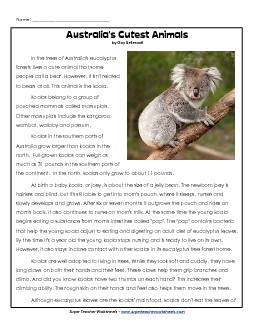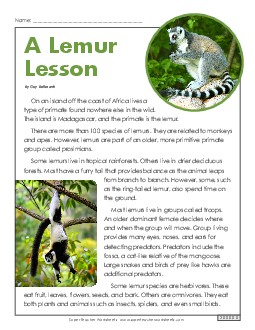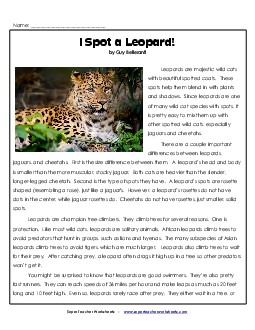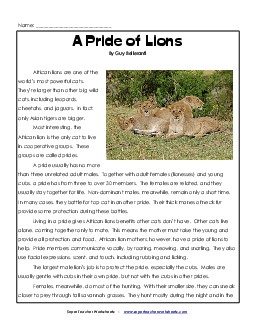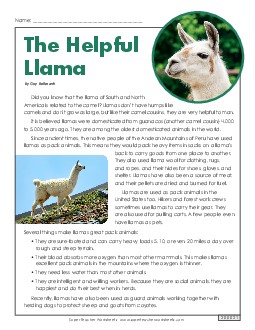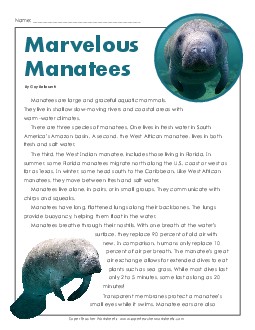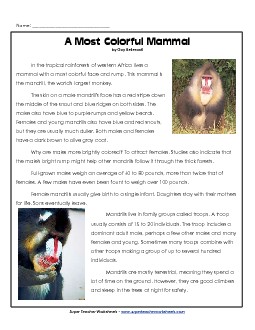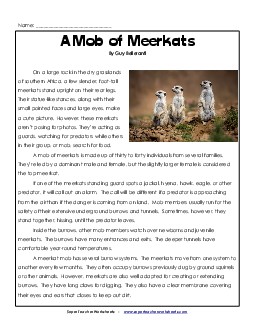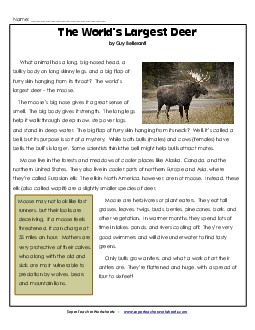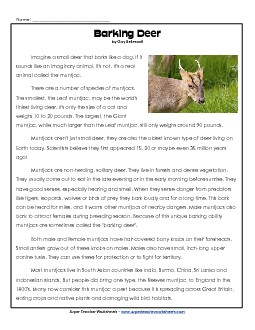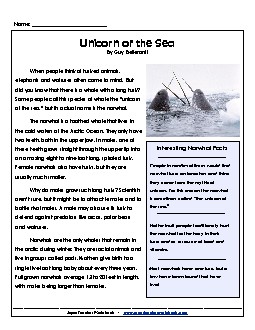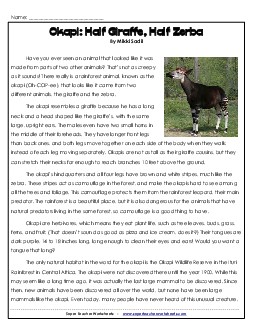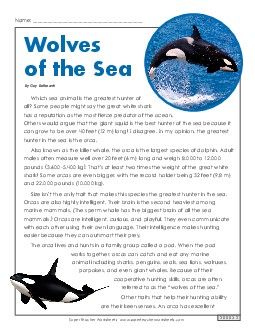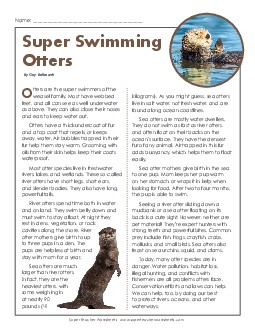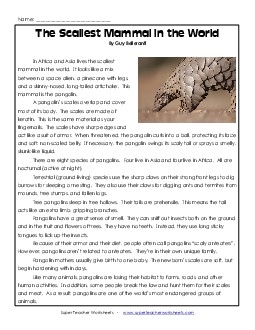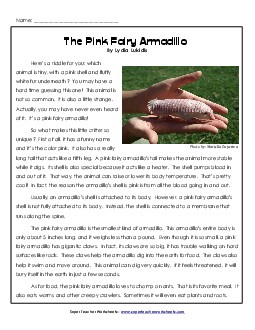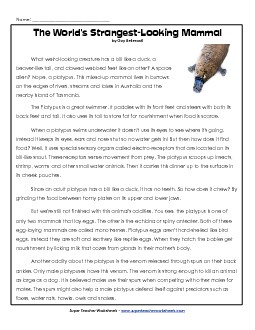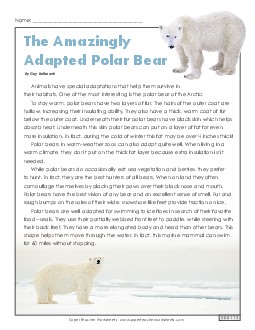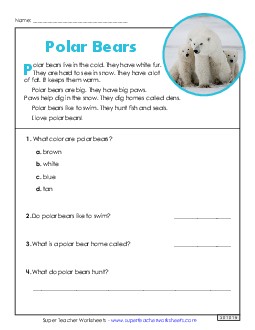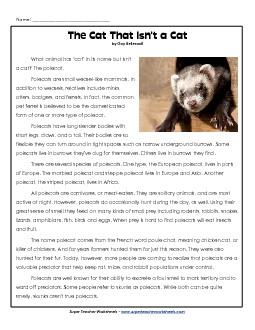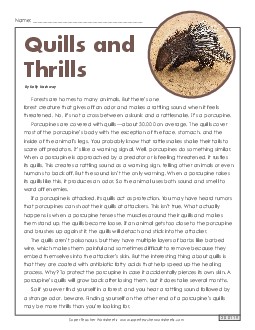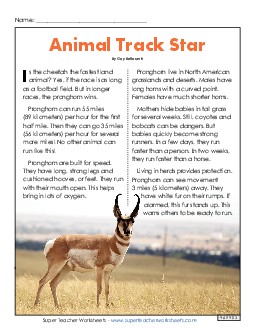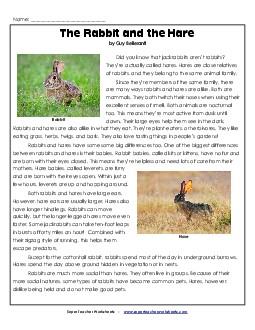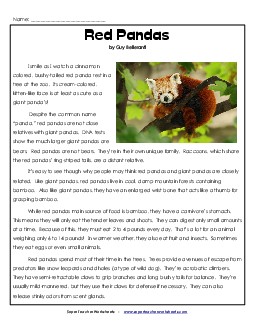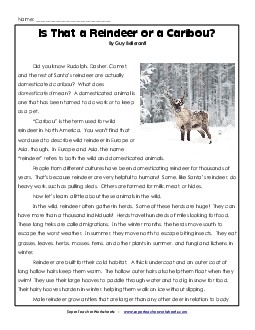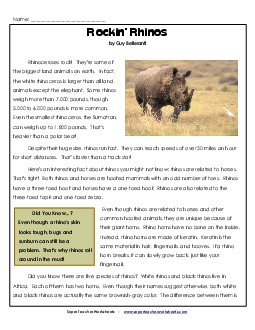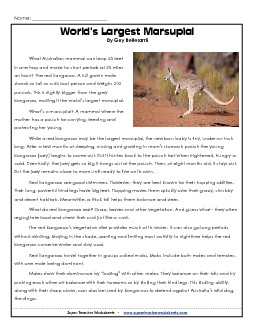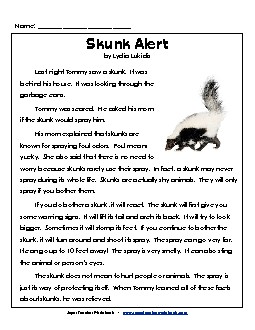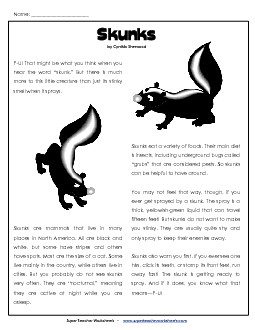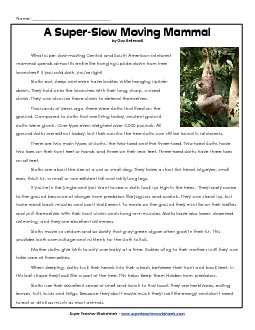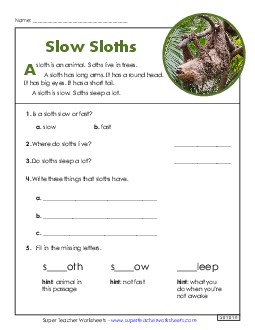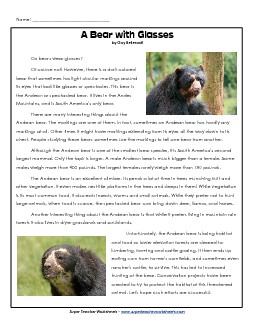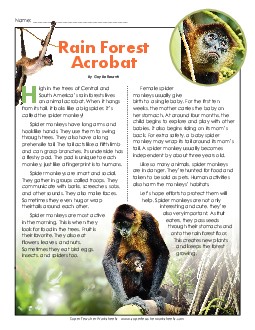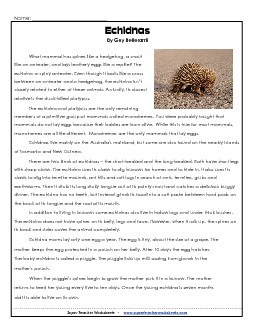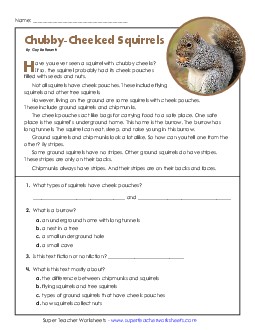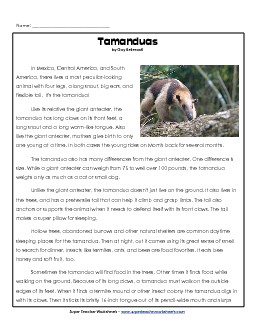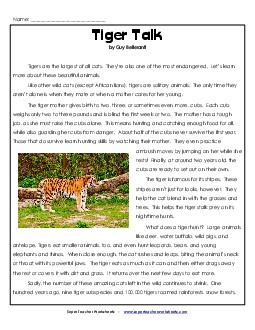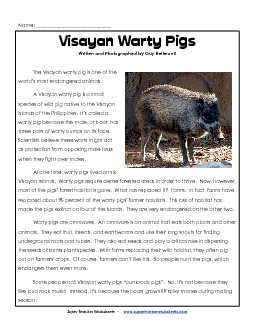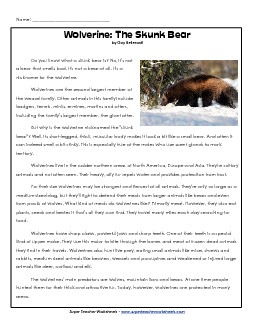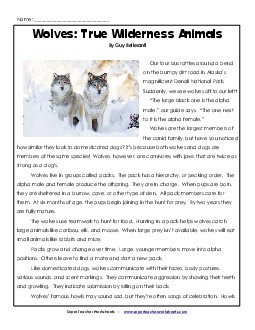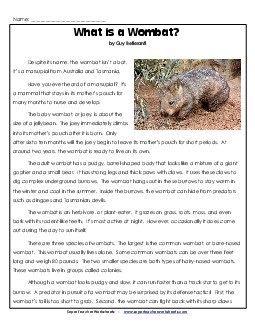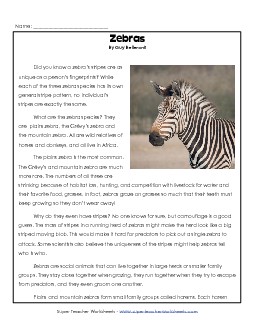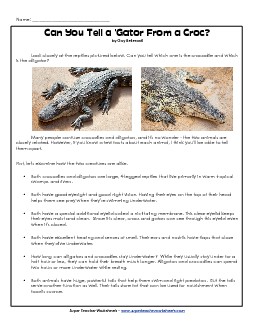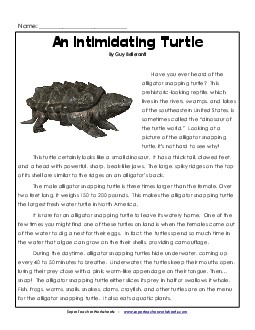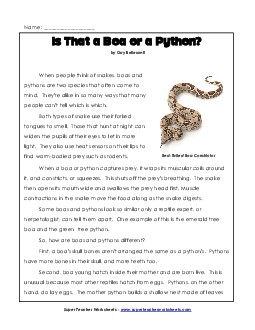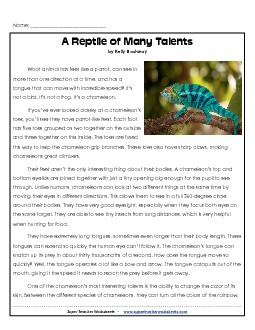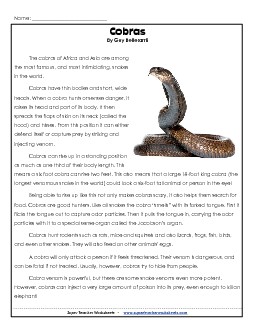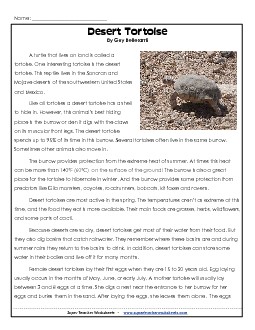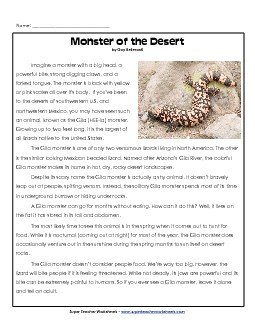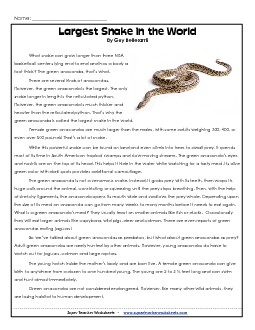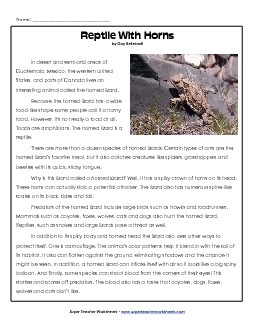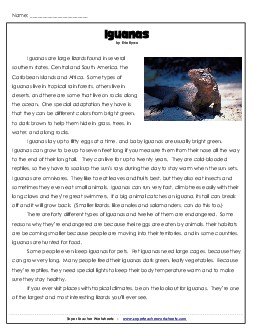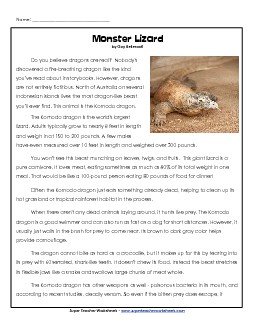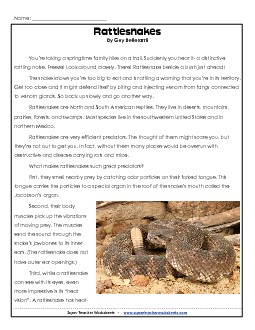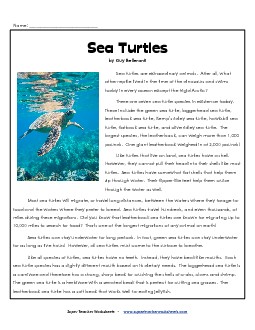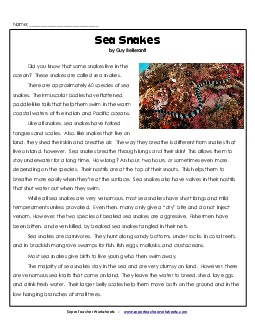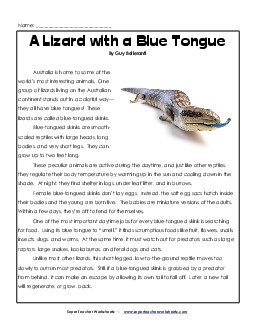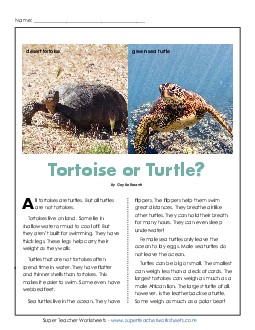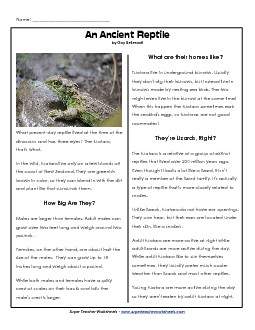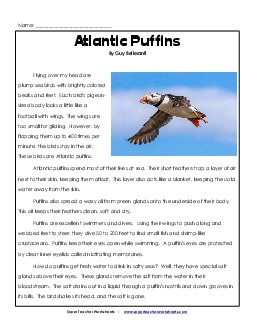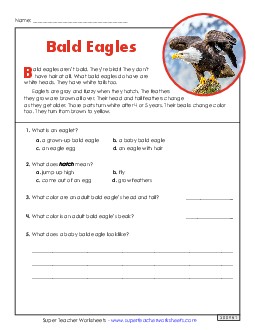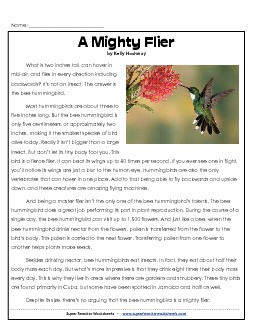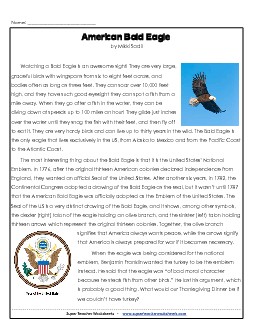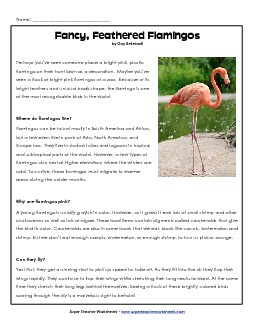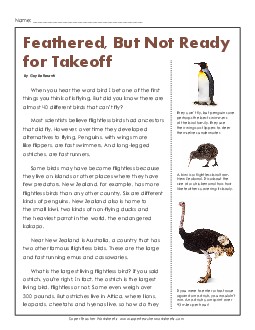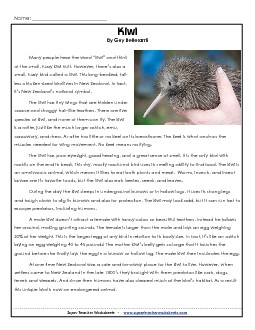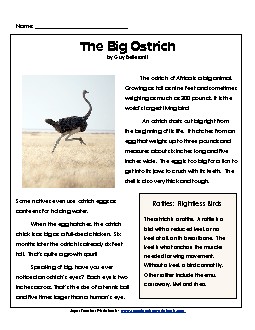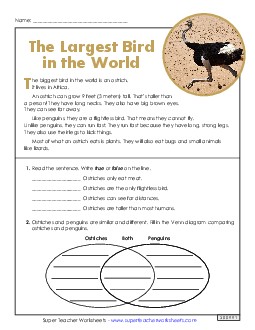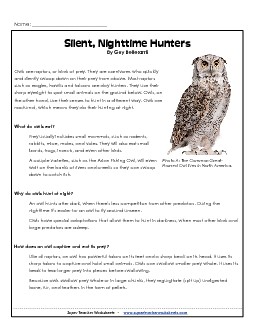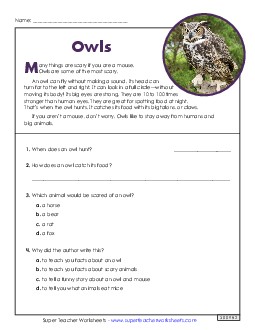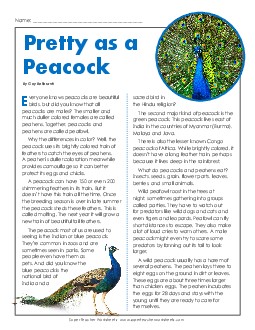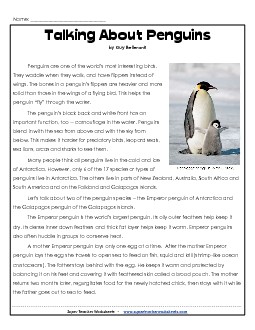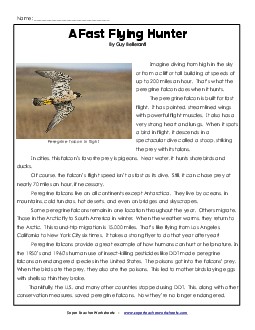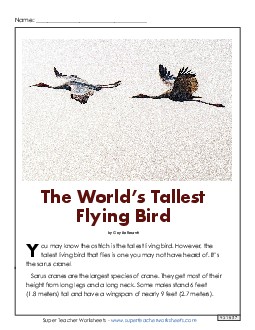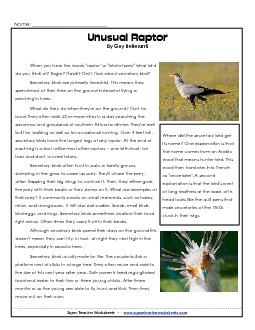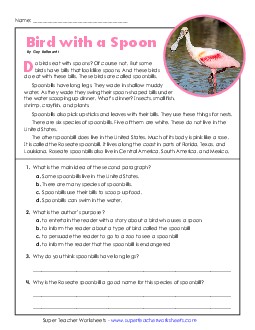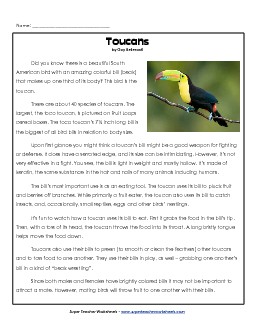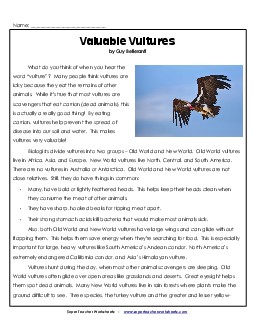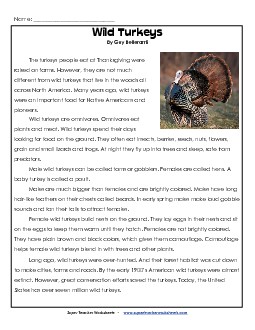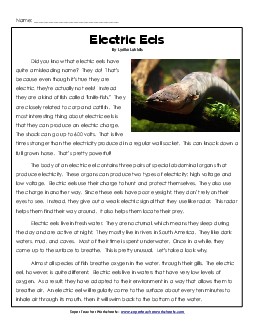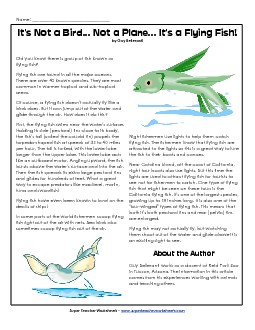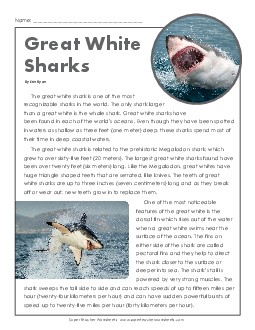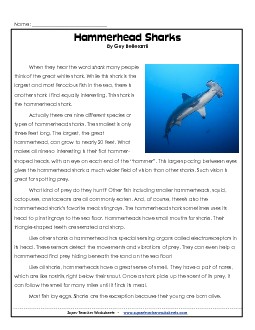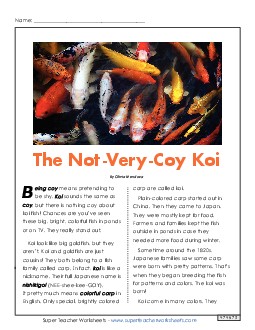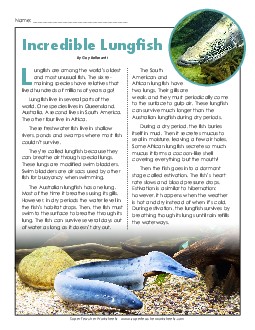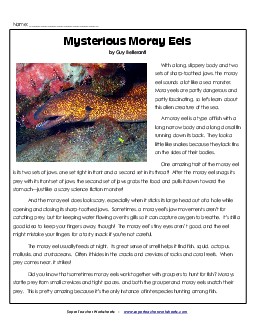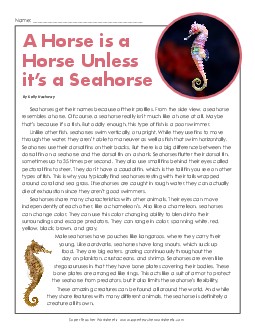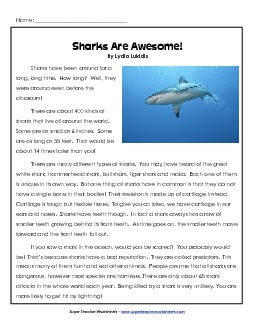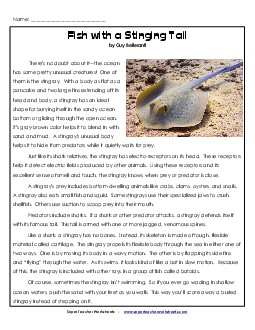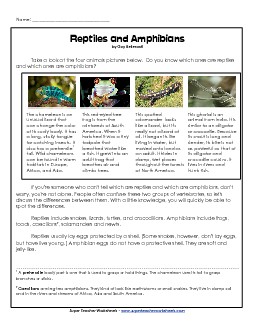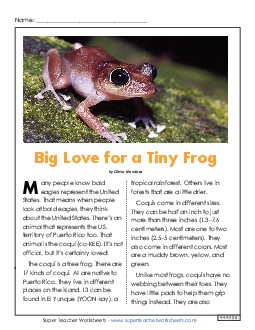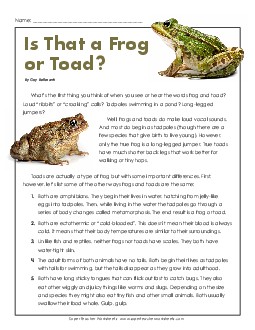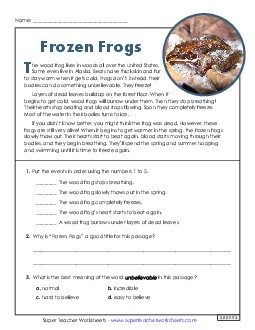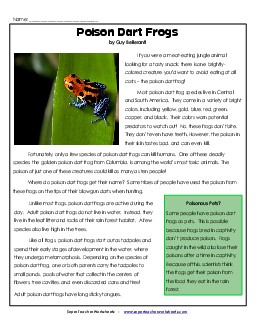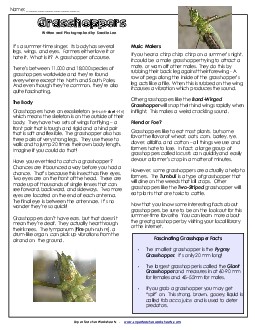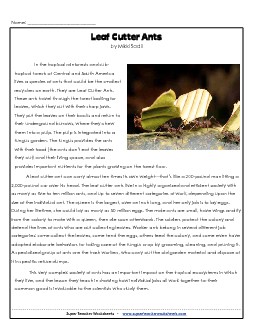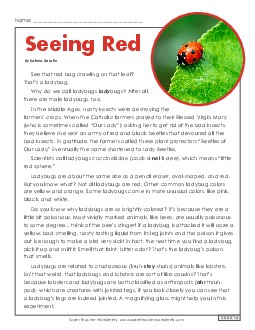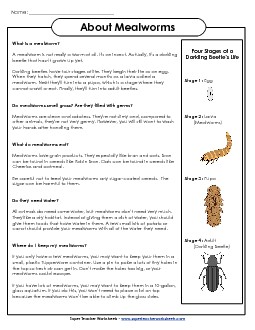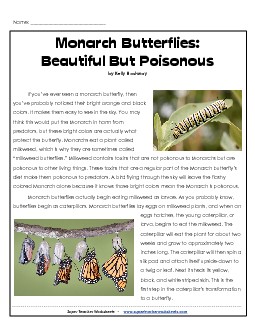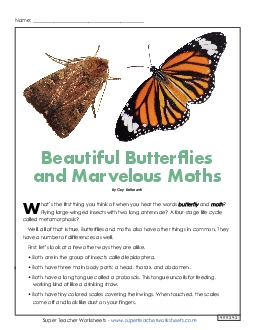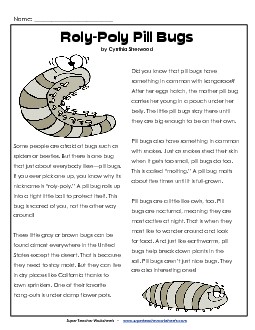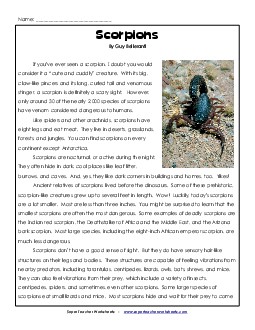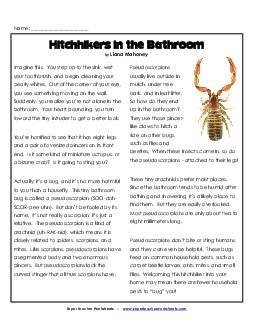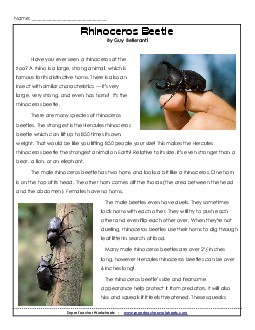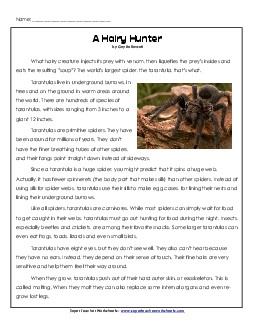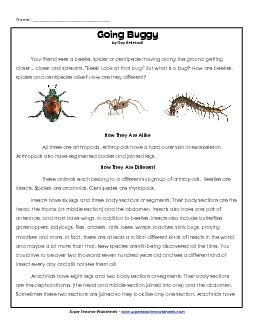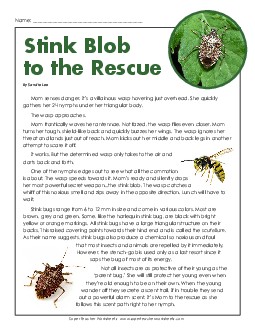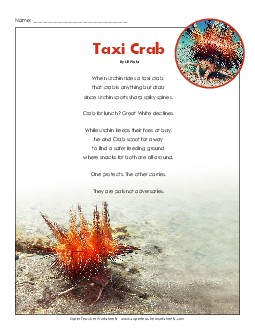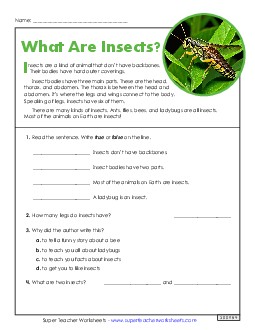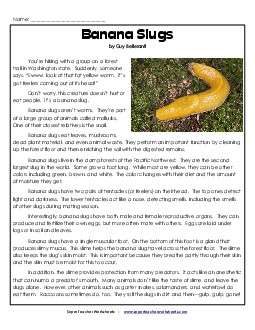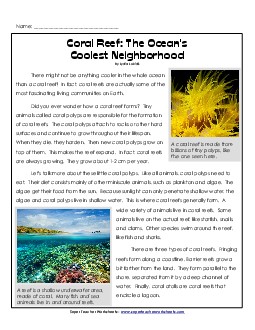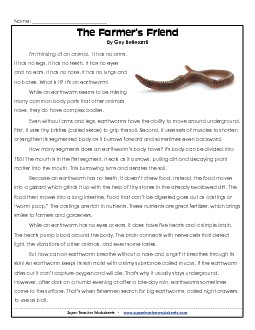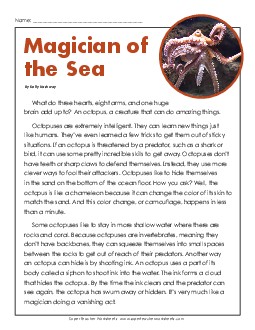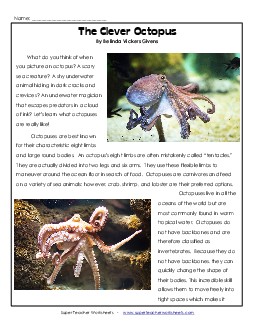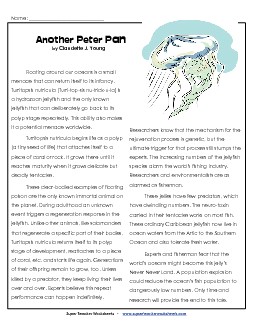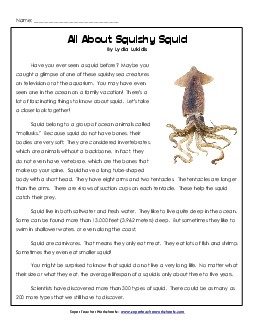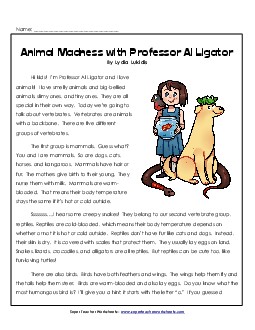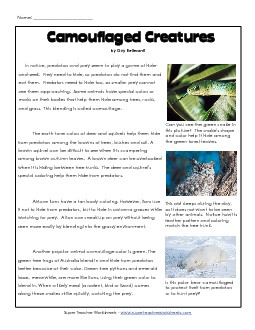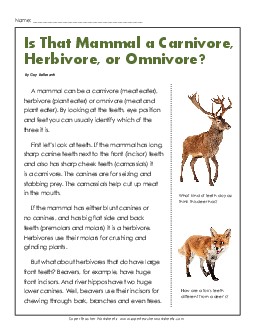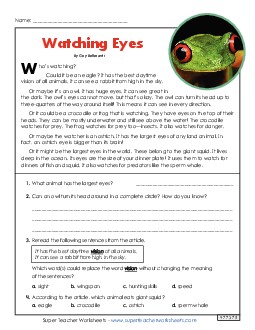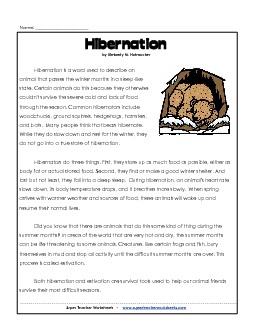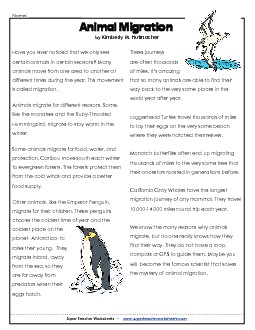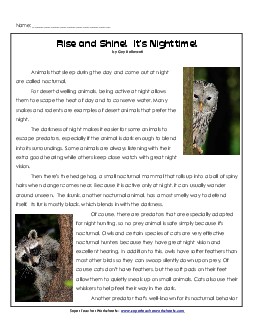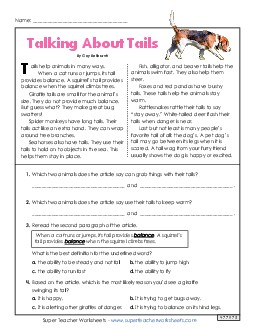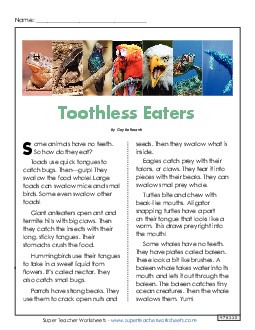Animal Articles (Reading Comprehension)
Kids will love learning about their favorite animal species by reading these interesting articles. We have scores of articles covering all types of animals, from aardvarks to zebras.
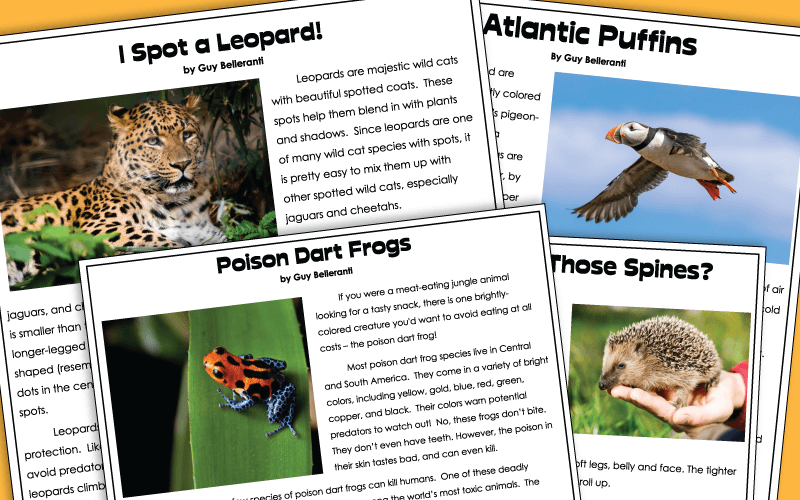
Even though they are sometimes called earth pigs, aardvarks aren't really related to pigs at all.
4th Grade
Filing Cabinet
Logged in members can use the Super Teacher Worksheets filing cabinet to save their favorite worksheets.
Quickly access your most used files AND your custom generated worksheets!
Please login to your account or become a member and join our community today to utilize this helpful feature.
Have your students read this informative article about African wild dogs. Then they will answer several comprehension questions, complete a vocabulary crossword, and respond to a writing prompt.
4th Grade
Learn all about one of the animals that symbolizes the United States of America: the American Bison! Discover the differences between bison and buffalo, and find out what makes the American Bison unique. Comprehension questions are included.
5th Grade
Learn about these white, furry hunters that make their home in the frozen tundra. You'll be amazed at the ways an arctic fox is adapted to live in its freezing environment.
5th Grade
Learn about the armored mammals called armadillos, which can be found in various areas throughout North and South America.
5th Grade
There are nearly a thousand different species of bat in the world today. Most eat insects or fruit, but there is one type- the vampire bat- that drinks blood.
(Approx. Grade Levels: 3-5)
(Approx. Grade Levels: 3-5)
3rd through 5th Grades
This article contains a list of common beaver questions, such as "What's the difference between a beaver lodge and a beaver dam?" Read to find out how much beavers weigh, what they eat, where they live, and more.
6th Grade
Bighorn Sheep have horns that weigh up to 30 pounds. Males will battle by ramming each other in the head.
4th Grade
Find out about what makes the blue whale special with this reading comprehension passage and worksheet.
5th Grade
Did you know that not all brown bears are actually brown? Learn how you can identify a brown bear in the wild and other interesting facts in this reading activity. This worksheet includes comprehension questions, vocabulary words, and a writing prompt.
5th Grade
Learn why camels have humps, how their coat helps them to survive, and other interesting camel facts.
3rd Grade
Cheetahs are the fastest land animals in the world, but even cheetahs have to be on the lookout for other predators.
5th Grade
Discover what's unusual about a chipmunk's cheeks, along with other interesting chipmunk facts.
2nd through 4th Grades
This one-page printout includes a short reading that describes man's best friend. Four questions are included below the reading.
2nd Grade
Learn how dolphins and porpoises are alike, and how they're different. This article includes a question page, a Venn diagram, and a vocabulary activity.
4th Grade
Find out why these strange animals are called elephant seals and learn about their unusual hunting habits.
4th through 6th Grades
Learn about elephant seals and what makes them unusual in this sixth-grade level reading comprehension article. This activity includes short answer comprehension questions, vocabulary words, and a writing prompt.
6th Grade
Fennec Fox FREE
The bushy-tailed, big-eared fennec fox in an amazing species that is adapted to live in desert climates.
4th Grade
Teach your students about the Florida panther with this engaging reading comprehension article and worksheet.
5th Grade
The flying fox may have one of the most misleading names of all animals. It's not a fox at all, but rather a bat! This article uses age-appropriate text to teach readers about these amazing animals. Reading comprehension questions, a vocabulary activity, and a writing prompt are also included.
2nd Grade
Did you know that flying squirrels can't actually fly? They glide from tree to tree, using a furry membrane like a parachute.
5th through 7th Grades
Did you know giant anteaters are one of the few mammals with no teeth? Learn a variety of interesting facts about giant anteaters in this fifth grade science article.
5th Grade
Learn about China's beloved and endangered bear. Reading comprehension questions are included.
5th Grade
Teach your students about gibbons with this article. The worksheet includes several reading comprehension questions based on the text, a vocabulary crossword, and a writing prompt.
4th Grade
Did you know groundhogs are great swimmers? And they can climb trees too! They can also bark and whistle. Learn these and many more interesting facts about groundhogs in this article.
2nd through 4th Grades
Read about the two types of hippos, river and pygmy, in this engaging article. Learn what they have in common and how they are different. Then answer the reading comprehension questions.
3rd Grade
The honey badger is arguably the most fearless animal on Earth. It eats porcupines and venomous snakes, raids beehives for honey, kidnaps baby cheetahs, and steals food from hungry lions.
4th Grade
Learn all about the very loud howler monkey in this reading comprehension article. This worksheet includes comprehension questions, vocabulary identification, and a writing prompt.
5th Grade
Hyenas are neither cats nor dogs, but in a family all their own. These fierce scavengers gobble up leftovers left by other animals.
5th Grade
Discover how jaguars live and hunt, and learn why these beautiful animals are endangered.
4th through 6th Grades
The cutest mammals in Australia actually have very sharp claws and they spend more time asleep than they do awake.
4th Grade
Learn about lemurs with this interesting article and then test your knowledge by answering the reading comprehension questions.
5th Grade
Learn all about the majestic leopard in this reading comprehension article. Worksheet includes comprehension questions, vocabulary words, and a writing prompt.
6th Grade
Did you know that lions are the only wild cats to live in cooperative groups, called prides? Learn this, and other interesting facts, about lions in this reading comprehension article. Includes comprehension questions, vocabulary words, and a writing prompt.
4th Grade
Llamas are are very helpful to man. They work as pack animals that carry heavy goods. They also provide wool for clothing. Some even help ranchers protect their sheep from coyotes.
4th through 6th Grades
This article has tons of facts about these marine mammals. Reading comprehension questions include multiple choice, short answer, a vocabulary exercise, and a writing prompt.
6th Grade
Mandrills, with their bright blue and red noses, are perhaps the most colorful mammals in the world.
5th Grade
Did you ever wonder what those funny little meerkats are doing when they stand up straight and tall? Discover the answer and many other interesting facts about meerkats in this reading comprehension article. Worksheet includes a writing prompt, comprehension questions, and vocabulary terms.
5th Grade
Learn all about moose, the world's largest deer, in this fascinating reading comprehension article, complete with comprehension questions, vocabulary words, and a writing prompt. An answer key is included.
5th Grade
Have you ever heard of a barking deer? If you visit South Asia you may see muntjacs - small deer that bark like dogs.
4th Grade
Narwhals are sometimes called "Unicorns of the Sea," but do you know why? It's because they have a nine-foot tusk that looks like a unicorn's horn.
6th Grade
Orcas, or killer whales, are known as wolves of the sea because of their hunting practices.
5th Grade
Learn about otters with this high-interest article. Discover differences between river and sea otters, and find out how we can help protect them. The worksheet features reading comprehension questions, a vocabulary activity, and a writing prompt.
4th Grade
Have you ever heard of the pangolin? This unusual little animal is the scaliest mammal in the world! Yes, that's right! These mammals have scales! Learn all about pangolins in this fifth grade level reading comprehension activity.
5th Grade
Have you ever heard of the pink fairy armadillo? Learn all about this miniature armadillo! This article includes short answer and multiple choice questions, vocabulary words, and a writing prompt.
3rd Grade
Porcupines FREE
It rattles like a rattlesnake and it it gives off a fowl odor like a skunk. What is it? A porcupine!
2nd through 4th Grades
Read all about these fast animals with this reading comprehension article. Then test students' comprehension with multiple choice and short answer questions, a vocabulary activity, and a writing prompt.
3rd Grade
Did you know that rabbits and hares are actually different? Learn the similarities and differences between rabbits and hares in this reading comprehension article. Comprehension questions, a writing prompt, and vocabulary words are included.
4th Grade
Find out fascinating facts about these furry mammals in Asia. Students will discover interesting information about this endangered species.
5th Grade
Learn all about reindeer in this intriguing article that explains the difference between the terms "reindeer" and "caribou" and describes what reindeer are like in the wild. Comprehension questions and vocabulary activity are included.
5th Grade
Learn all about incredible rhinos in this reading comprehension article. Short answer comprehension questions, vocabulary words, and a writing prompt are included.
5th Grade
This article will teach students about the red kangaroo. Measuring 6 feet tall and weighing 200 pounds, it is the world's largest marsupial.
6th Grade
Learn many fascinating facts about skunks! Did you know that skunks are actually very shy? Discover this and much more!
2nd Grade
Find out basic facts about sloths in this short passage written for students at an early-elementary reading level.
1st Grade
Bears don't wear glasses, but the spectacled bear from South America has circular markings that make it look like it's got spectacles.
4th Grade
This informative article has facts all about the acrobats of the rain forest--spider monkeys! Worksheet includes comprehension questions, a vocabulary activity, and a writing prompt.
4th Grade
Echidnas are one of only two mammals they lay eggs. Females also have a pouch to carry their babies, just like kangaroos.
5th Grade
Find out about squirrels with this informative short passage. Four reading comprehension questions are featured after the passage.
3rd Grade
This strange looking animal has four legs, a long snout, large ears,and lurks in the forests of Central and South America.
4th Grade
Learn all about the beautiful and powerful tiger in this reading comprehension article with short answer questions, vocabulary words, and a writing prompt.
4th Grade
The Visayan warty pig is wild pig that is native to the Visayan Islands of the Philippines. It is one of the world's most endangered animals.
5th Grade
The wolverine is a solitary, but fierce, hunter who lives in snowy, northern climates across the world.
4th Grade
Learn all about majestic wolves in this reading comprehension activity! Students will discover why wolves howl, where they live, and much more. This English language arts activity includes comprehension questions, vocabulary words, and a writing prompt.
5th and 6th Grades
Learn about this fascinating marsupial from Down Under! The article includes reading comprehension questions, a writing prompt, and vocabulary words.
5th Grade
How do zebras protect themselves from predators? They run, kick, and bite. They even sleep standing up so they're ready to run at any sign of danger.
5th Grade
This prehistoric reptile looks like a small dinosaur. It has a thick tail, clawed feet, and strong jaws. Underwater, they keep their mouths open, and use their worm-like tongue to lure in prey.
3rd through 5th Grades
Learn the similarities and differences between boas and pythons with this compare/contrast article.
4th Grade
Chameleons can change color, rotate their eyes, and have toes that are specially adapted for climbing.
3rd through 5th Grades
Did you know that a king cobra can inject enough venom to kill an elephant? Learn this, and many more fun facts about cobras.
5th Grade
The desert tortoise lives in the Mojave and Sonoran Desert of the southwestern USA. They get most of their water from food and can live over 50 years.
5th Grade
Lurking in the deserts of the Southwestern United States is a colorful monster with a forked tongue, big head, and powerful claws.
5th Grade
The green anaconda is the largest snake in the world! It lives in South American swamps, weighs 500 pounds and eats pigs, deer, and even jaguars!
5th Grade
Are dragons real? You bet they are. Indonesians know all about the fierce lizard known as the Komodo dragon.
4th Grade
Rattlesnakes are efficient predators, but they can also be prey to larger, desert-dwelling animals. They use their rattle to warn predators of their venom.
5th Grade
Did you know that sea turtles have been around since the time of the dinosaurs? Learn all about the fascinating world of sea turtles. Discover the names of the seven sea turtle species, learn about the obstacles baby sea turtles face when they hatch, and find out the dangers sea turtles face today.
6th Grade
Learn all about sea snakes in this fascinating article. Did you know there are more than 60 species of sea snakes? Discover this and other interesting facts about sea snakes. Worksheet includes reading comprehension questions, vocabulary terms, and a writing prompt.
6th Grade
Have you ever heard of the blue-tongued skink? This unusual Australian animal is surprisingly gentle and can even regrow its own tail! Find out more about this amazing reptile in this reading comprehension article. Worksheet includes multiple choice questions, vocabulary words, and a writing prompt.
5th Grade
This third-grade level reading comprehension passage describes some of the differences between tortoises and turtles. Students will read it and be able to answer several questions, complete a vocab activity, and respond to a writing prompt.
3rd Grade
These cute birds make their home off the coasts of the northeastern U.S. and Canada. They live in colonies ranging from hundreds to hundreds of thousands. Learn more interesting facts about these fascinating sea birds! Activity includes reading comprehension questions, a writing prompt, and vocabulary words.
5th Grade
It takes many years for bald eagles' tail and head feathers to turn white. Learn about those and another color-changing body part in these short paragraphs.
2nd Grade
Bee Hummingbird FREE
The world's smallest bird - the bee hummingbird - can hover in place, fly upside down, and even fly backwards.
4th Grade
The American bald eagle has such good eyesight, it can spot a fish from a mile away! It is also a national symbol of the United States.
5th Grade
The flamingo is one of the most recognized birds in the world because of it's unusual body shape and hot-pink feathers.
4th Grade
The kiwi is an unusual bird with a long beak, no tail, and long legs. There are five species of kiwis and none of them can fly.
5th Grade
Did you know that an ostrich's eyes weigh weigh twice as much as its brain? Learn interesting facts about ostriches in this nonfiction article. This reading comprehension worksheet is designed for fourth grade level readers and includes reading comprehension questions, vocabulary exercises, and a writing prompt. Learn about the big and exciting ostrich!
4th Grade
Do your kids find flightless birds fascinating? This shorter and simplified passage has facts about the world's largest bird, followed by four true/false questions and a graphic organizer to fill in.
2nd Grade
Owls have special adaptations that allow them to fly without making a sound, and hunt during the dark nighttime hours.
3rd through 5th Grades
Give your students this short passage about owls and have them read it and complete the questions to test their understanding.
2nd Grade
Did you know that all peacocks are male? Female peacocks are called peahens. In this article students will learn many fascinating facts about peafowl.
5th Grade
Penguins FREE
Learn about two different penguin species - the Emperor penguin and the Galapagos penguin. One of them lives in frigid Antarctica. The other lives on the tropical Equator.
5th Grade
Did you know the peregrine falcon can dive up to 200 miles per hour and hunt prey at speeds of up to 70 miles per hour? Learn more fascinating facts about the peregrine falcon in this article geared toward a fifth grade reading level. Comprehension activities included.
5th Grade
Read all about the world's tallest flying bird in this full-length article. Then complete six comprehension questions, a vocabulary activity, and maybe even the optional research writing prompt.
5th Grade
The secretary bird is a large, terrestrial raptor from Africa. It eats mice, hares, mongooses, lizards, and even snakes.
4th Grade
A toucan's colorful bill is certainly beautiful, but did you know that it also helps the toucan in many ways?
5th Grade
Did you know there are Old World vultures and New World vultures? Learn the differences between them in this fascinating article. Worksheet includes reading comprehension questions, vocabulary terms, and a writing prompt.
6th Grade
What's the difference between a tom, a gobbler, a hen, and a pult? Find out in this article about wild turkeys.
2nd Grade
Electric eels sure are electric, but did you know they're not really eels? Learn interesting facts about electric eels in this reading comprehension article. Includes comprehension questions, vocabulary words, and a writing prompt.
4th Grade
Look out! The world's second largest, and most ferocious shark may be swimming in an ocean near you.
3rd through 5th Grades
The hammerhead shark is one of the fiercest and most dangerous animals in the sea. It uses electroreceptors in its unusual-shaped head to find prey.
4th Grade
Did you know koi are a kind of carp? Koi come in a variety of colors, patterns, and fin shapes. They're lovely to look at, but their price and life spans might surprise you!
3rd and 4th Grades
Lungfish have the ability to survive in hot, dry climates. They have the ability to go into a dormant stage called estivation, and they have lungs that allow them to breathe air.
5th Grade
A sea creature with two sets of jaws and a long, snake-like body?! That's a moray! Learn about the mysterious, shy, and elusive moray eel.
6th Grade
Your students will learn lots of interesting and unusual facts about seahorses when they read this article.
3rd through 5th Grades
Did you know that a stingray's skeleton is made up of cartilage instead of bones? Learn this and other interesting facts about stingrays in this fourth grade level reading comprehension activity.
4th Grade
Can your students tell a reptile from an amphibian? This compare and contrast article will help students learn the differences between these two vertebrate groups.
4th Grade
Puerto Rico's unofficial version of a national animal is the coqui. This tiny frog happens to be the loudest amphibian in the world! Learn all about it in this 2-page article.
3rd through 5th Grades
Print off this short article and have your students learn all about the wood frog. This amazing amphibian hibernates by freezing! Students will read the engaging article and then answer 3 questions about the material.
3rd Grade
Learn all about the fascinating poison dart frog. The Colombian poison dart frog is one of the most toxic species on earth, but did you know poison dart frogs may have the ability to help humans?
6th Grade
Are grasshoppers a farmer's friend or foe? Actually, both. Find out how grasshoppers can help and harm humans.
3rd through 6th Grades
Find out how monarch butterflies protect themselves and learn about their transformation from caterpillar to butterfly.
3rd through 5th Grades
Learn all about roly-poly pill bugs, which curl up in a ball to protect themselves.
3rd through 5th Grades
Did you know there are almost 2,000 different species of scorpions? Learn this and other fun facts about scorpions in this nonfiction article. Article includes comprehension questions, vocabulary words, and a writing prompt.
5th Grade
Pseudoscorpions are tiny, harmless scorpion-like creatures that can sometimes be found in bathrooms. Read about these interesting arachnids and answer the questions. (non-fiction)
3rd through 5th Grades
Do you know what the strongest animal on Earth is? A bear? An elephant? Actually it's the rhinoceros beetle! This large insect can lift 850 times its own weight!
6th Grade
Tarantulas are different from other spiders because they don't spin webs to trap food and they live in underground burrows.
3rd through 5th Grades
Discover the stink bug - an animal that uses a noxious odor to scare enemies away.
3rd through 5th Grades
A a crab and a sea urchin have symbiotic relationship. The sea urchin protects the crab with it's sharp spikes, while the crab helps the urchin move around the ocean floor.
6th Grade
Students will read about the defining characteristics of insects in this short article, tailored for grades 2 and up. Identify the author's purpose, complete a 4-part true or false question, and more.
2nd through 4th Grades
Have you ever seen a banana slug? These mollusks really do look exactly like the fruit they're named after! Learn interesting facts about banana slugs in this animal article. Includes comprehension questions, vocabulary words, and a writing prompt.
5th Grade
Want to learn all about coral reefs? This article describes the ocean's most unique living community. Home to thousands of species of fish and other sea animals, coral reefs play an important role in the well-being of the Earth. This reading comprehension article includes short answer, multiple choice, and vocabulary questions.
3rd Grade
Earthworms have no eyes, no nose, no ears, no bones, no arms, and no legs. They do, however, have very complex bodies.
2nd through 5th Grades
I bet you didn't know that an octopus can vanish in a cloud of smoke. It's just one of the unique ways an octopus can defend itself.
3rd through 5th Grades
Learn all about the clever octopus in this nonfiction science article targeted toward a fifth-grade reading level!
5th Grade
A fascinating article about a special type of jellyfish that can revert back to infancy and begin its life all over again.
5th Grade
Learn about the shy and squishy squid! Did you know that a giant squid can grow up to the size of a school bus?! Discover other interesting facts in this printable animal article. Vocabulary words, comprehension questions, and a writing prompt are included in this reading comprehension packet.
3rd Grade
Professor Al Ligator teaches kids about the five groups of vertebrates. Kids will learn all about mammals, reptiles, birds, amphibians, and fish.
3rd Grade
Many animals use camouflage to hide from predators and to avoid being seem while hunting.
3rd through 5th Grades
Compare and contrastthree types of animals - herbivore, carnivore, and omnivore.
3rd through 5th Grades
Learn what animals can be underwater but still see above the water, which has the largest eyes of them all, and more fun facts about animal eyes with this short article.
3rd Grade
Hibernation is when animals slow down for the winter and fall into a sleep-like state. Learn about animal hibernation with this interesting article.
3rd through 5th Grades
This passage is about animals who are adapted to sleep during the day and become active during the nighttime hours.
3rd through 5th Grades
Your students can read this short article about animal tails and answer the comprehension questions that follow.
3rd Grade
Find out how animals without teeth are able to eat with this engaging article and worksheet.
3rd Grade
Third grade stories, articles, passages and poems
Fourth Grade Reading Comprehension WorksheetsFourth grade reading stories, articles, and poems
Fifth Grade Reading Comprehension WorksheetsFifth grade reading stories, articles, and poems
Science: Animal WorksheetsAnimal (vertebrate) classification worksheets
